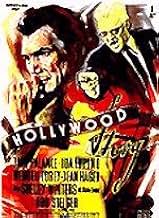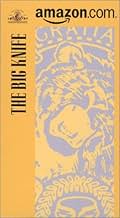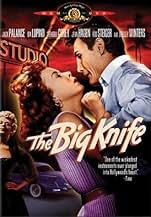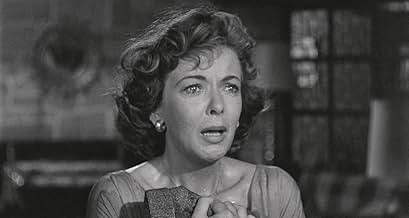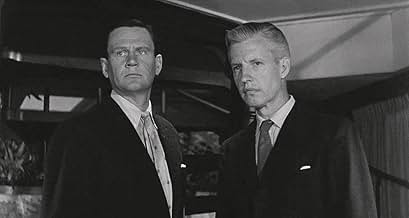NOTE IMDb
6,8/10
4,6 k
MA NOTE
Ajouter une intrigue dans votre langueHollywood actor Charles Castle is pressured by his studio boss into a criminal cover-up to protect his valuable career.Hollywood actor Charles Castle is pressured by his studio boss into a criminal cover-up to protect his valuable career.Hollywood actor Charles Castle is pressured by his studio boss into a criminal cover-up to protect his valuable career.
- Réalisation
- Scénario
- Casting principal
- Récompenses
- 1 victoire et 2 nominations au total
Michael Winkelman
- Billy Castle
- (as Mike Winkelman)
Shelley Winters
- Dixie Evans
- (as Miss Shelley Winters)
Richard Boone
- Narrator
- (voix)
- (non crédité)
Nick Cravat
- Nick
- (non crédité)
Robert Emhardt
- Bit Part
- (non crédité)
Michael Fox
- Prize Fight Announcer
- (non crédité)
Paula Kyle
- Party Guest
- (non crédité)
Avis à la une
A truly memorable film with tough and rugged, but hardly handsome, Jack Palance as Charlie Castle playing of all people an actor who's always playing matinée Idols and great lovers. As Charlie's boss and studio owner Stanley Hoff,Rod Steiger, says of him throughout the film :"He makes all the women of America heart's swoon". "The Big Knife" is worth the price of admission just to see how and if director Robert Aldrich can pull it off and make the film both entertaining and believable.
You see Charlie is getting tired of playing all those roles over the years as a heart throb to the women of America and wants to get out of his contract with the Hoff Studios and go independent; That was a big thing for actors back in the 1950's. Charlie wan't to do films that are worthy of his extraordinary talents as a serious and Shakespearian actor. It's that Charlie's off the wall and possessive boss Stanley Hoff, the Big Knife, doesn't want his meal ticket to leave and take his fans with him! So Stanley rolls out the heavy artillery and plays his trump card. It seems that Charlie has a dark secret that the studio has been covering up for years and if Charlie leaves that secret won't be a secret any more! Get It Charlie!
The film "The Big Knife" can really be described as one of the most multi storied soap operas ever put on film with the audience needing score cards just to keep up with the story and even then they'll get lost. Whoever coined the phrase "Seeing is believing" must have based it on the the incredible performance of Rod Steiger's Stanley Hoff which goes from a Saturday Night Live impersonation shtick of a big Hollywood producer to an Oscar winning interpretation of Hamlet all at the same time! It's really incredible to watch and believe what your seeing in Steiger's over the top performance.
And Jack Palance, determined not to be shown up his co-star, really did pull it off in him Playing a role so out of character and yet evoking real and genuine sympathy from the audience that he should have, but didn't, won the 1955 Academy Award for best actor hands down! As the tortured soul with a dark past who only wanted to do Art Films and get away from playing debonair and charming movie parts that make women go ape all over him. In the end of the film when Palance went all out, or was it underwater, in the final few minutes of the movie he was so convincing that I just couldn't keep the tears from rolling down my cheeks!
No matter how much people criticize Robert Aldrich's "The Big Knife" and with good justification this is one movie where you can really say that the acting actually overwhelmed the script!
You see Charlie is getting tired of playing all those roles over the years as a heart throb to the women of America and wants to get out of his contract with the Hoff Studios and go independent; That was a big thing for actors back in the 1950's. Charlie wan't to do films that are worthy of his extraordinary talents as a serious and Shakespearian actor. It's that Charlie's off the wall and possessive boss Stanley Hoff, the Big Knife, doesn't want his meal ticket to leave and take his fans with him! So Stanley rolls out the heavy artillery and plays his trump card. It seems that Charlie has a dark secret that the studio has been covering up for years and if Charlie leaves that secret won't be a secret any more! Get It Charlie!
The film "The Big Knife" can really be described as one of the most multi storied soap operas ever put on film with the audience needing score cards just to keep up with the story and even then they'll get lost. Whoever coined the phrase "Seeing is believing" must have based it on the the incredible performance of Rod Steiger's Stanley Hoff which goes from a Saturday Night Live impersonation shtick of a big Hollywood producer to an Oscar winning interpretation of Hamlet all at the same time! It's really incredible to watch and believe what your seeing in Steiger's over the top performance.
And Jack Palance, determined not to be shown up his co-star, really did pull it off in him Playing a role so out of character and yet evoking real and genuine sympathy from the audience that he should have, but didn't, won the 1955 Academy Award for best actor hands down! As the tortured soul with a dark past who only wanted to do Art Films and get away from playing debonair and charming movie parts that make women go ape all over him. In the end of the film when Palance went all out, or was it underwater, in the final few minutes of the movie he was so convincing that I just couldn't keep the tears from rolling down my cheeks!
No matter how much people criticize Robert Aldrich's "The Big Knife" and with good justification this is one movie where you can really say that the acting actually overwhelmed the script!
The Big Knife is not for everybody. Some will find it very literate, well-directed and acted(mostly), handling the tense and satire aspects deftly, while others will find it overdone. Both viewpoints are completely understandable, for me there were parts where the film did fall into the latter camp but most of the time it was the former.
As an adaptation of the stage play, which is very compelling and thought-provoking, it is very faithful and translates well adaptation-wise. As a film, it's far from perfect but it comes over well as a film.
There are a few things that don't come off quite as successfully as the rest of the film. Rod Steiger has a very ruthless character, but for my tastes Steiger plays the role too broadly to the point that Hoff felt more of a cartoonish caricature than a real person, to the extent that it came close to hurting the balance of the film and he didn't come over as very threatening. In his performance, there is a lot of camp and scenery-chewing, but not enough of the menace that the role so ruthlessly written needs. The ending does dissolve into contrived melodrama, which is where it is most understandable as to why some will find the film overdone, and felt rushed as well. Lastly, the film does feel over-scored in places, in the places where there is music the blaring music cues felt intrusive.
With the exception of Steiger, the performances are very good. Jack Palance's powerhouse lead performance is one of his best, while Ida Lupino is heart-wrenching and dignified. Wendall Corey wisely underplays and is very entertaining, and Everett Sloane, Jean Hagen(chilling in a role so different to hers in Singin' In the Rain) and a memorable Shelley Winters(in a performance that hits hard) do equally pleasingly. The script is remarkably literate and intelligent, with the tension being portrayed quite realistically and the satire being boldly lacerating. The story moves deliberately, but the tension present is enough to haunt the mind and the subject matter is a bold one and told in a biting, sometimes fun and poignant way. The Big Knife is photographed with class and atmosphere, the production values are appropriately claustrophobic and Robert Aldrich's direction is more than able, often excellent.
Overall, a very acquired taste, but for this viewer while not without flaws it was a well done film. 7/10 Bethany Cox
As an adaptation of the stage play, which is very compelling and thought-provoking, it is very faithful and translates well adaptation-wise. As a film, it's far from perfect but it comes over well as a film.
There are a few things that don't come off quite as successfully as the rest of the film. Rod Steiger has a very ruthless character, but for my tastes Steiger plays the role too broadly to the point that Hoff felt more of a cartoonish caricature than a real person, to the extent that it came close to hurting the balance of the film and he didn't come over as very threatening. In his performance, there is a lot of camp and scenery-chewing, but not enough of the menace that the role so ruthlessly written needs. The ending does dissolve into contrived melodrama, which is where it is most understandable as to why some will find the film overdone, and felt rushed as well. Lastly, the film does feel over-scored in places, in the places where there is music the blaring music cues felt intrusive.
With the exception of Steiger, the performances are very good. Jack Palance's powerhouse lead performance is one of his best, while Ida Lupino is heart-wrenching and dignified. Wendall Corey wisely underplays and is very entertaining, and Everett Sloane, Jean Hagen(chilling in a role so different to hers in Singin' In the Rain) and a memorable Shelley Winters(in a performance that hits hard) do equally pleasingly. The script is remarkably literate and intelligent, with the tension being portrayed quite realistically and the satire being boldly lacerating. The story moves deliberately, but the tension present is enough to haunt the mind and the subject matter is a bold one and told in a biting, sometimes fun and poignant way. The Big Knife is photographed with class and atmosphere, the production values are appropriately claustrophobic and Robert Aldrich's direction is more than able, often excellent.
Overall, a very acquired taste, but for this viewer while not without flaws it was a well done film. 7/10 Bethany Cox
Unless you understand that The Big Knife was Clifford Odets's one finger salute to Hollywood and its mores, you will not understand the film at all. Odets after some bad times in tinseltown went back to his first love which was the theater and wrote this play which ran for 109 performances in the 1949 season on Broadway.
In the lead roles of actor Charlie Castle and producer Marcus Hoff, Odets cast a couple of guys who were having difficulty finding employment in Hollywood at that time as well, kindred spirits from the Group Theater back in the day, John Garfield and J. Edward Bromberg. Garfield who certainly could bring his own life into the part plays Odets himself who had as tempestuous personal life as his creation Charlie Castle. He feels starved creatively because of the junk he's been doing in Hollywood, not the stuff of social significance that Odets did back Group Theater days.
Jack Palance plays Castle in the film and while he does justice to the part I only wish John Garfield had lived to do the screen version of what he created. He had an unceasing rebellion against Warner Brothers for the stereotypical tough guys parts he was being cast in. But just after he broke free came the blacklist.
Rod Steiger is malevolence itself as the producer whom I believe was based on Louis B. Mayer. Odets dealt with him through his then wife Luise Rainer over at MGM. Mayer was not liked even by his fellow studio moguls and he had been toppled in a studio power play at MGM a few years earlier. Had he still been in charge at MGM, I'm willing to bet The Big Knife might never have been made even as an independent film with a United Artists release.
Director Robert Aldrich filled out the rest of the cast with familiar Hollywood names like Ida Lupino as Palance's estranged wife, Everett Sloane as his long suffering agent, Wendell Corey in a role that has to be modeled on MGM's fixer who knew where all the bodies were buried Eddie Mannix, Shelley Winters as the bimbo like starlet who can put an end to Palance's career and Ilka Chase as a Hedda Hopper like columnist who is the self appointed keeper of the Hollywood morals. Chase's scenes are at the beginning of the film and she really has the columnist character dead on.
On stage the entire play is set in the living room of the Palance/Lupino Hollywood style mansion. Like the house in Long Day's Journey Into Night, the opulent living room becomes a character itself, showing the velvet and comfortable trap that Palance is in and why he just can't give up all this comfort, even for the art that used to motivate him.
Odets might have done better had someone else a little more dispassionate had written this based on his memoirs. The Big Knife gets a little too personal at times. And it never quite loses the stage origin even with a few scenes away from the house. But the acting his first rate from a first rate cast. I'd watch The Big Knife as a look into the mind of Clifford Odets.
In the lead roles of actor Charlie Castle and producer Marcus Hoff, Odets cast a couple of guys who were having difficulty finding employment in Hollywood at that time as well, kindred spirits from the Group Theater back in the day, John Garfield and J. Edward Bromberg. Garfield who certainly could bring his own life into the part plays Odets himself who had as tempestuous personal life as his creation Charlie Castle. He feels starved creatively because of the junk he's been doing in Hollywood, not the stuff of social significance that Odets did back Group Theater days.
Jack Palance plays Castle in the film and while he does justice to the part I only wish John Garfield had lived to do the screen version of what he created. He had an unceasing rebellion against Warner Brothers for the stereotypical tough guys parts he was being cast in. But just after he broke free came the blacklist.
Rod Steiger is malevolence itself as the producer whom I believe was based on Louis B. Mayer. Odets dealt with him through his then wife Luise Rainer over at MGM. Mayer was not liked even by his fellow studio moguls and he had been toppled in a studio power play at MGM a few years earlier. Had he still been in charge at MGM, I'm willing to bet The Big Knife might never have been made even as an independent film with a United Artists release.
Director Robert Aldrich filled out the rest of the cast with familiar Hollywood names like Ida Lupino as Palance's estranged wife, Everett Sloane as his long suffering agent, Wendell Corey in a role that has to be modeled on MGM's fixer who knew where all the bodies were buried Eddie Mannix, Shelley Winters as the bimbo like starlet who can put an end to Palance's career and Ilka Chase as a Hedda Hopper like columnist who is the self appointed keeper of the Hollywood morals. Chase's scenes are at the beginning of the film and she really has the columnist character dead on.
On stage the entire play is set in the living room of the Palance/Lupino Hollywood style mansion. Like the house in Long Day's Journey Into Night, the opulent living room becomes a character itself, showing the velvet and comfortable trap that Palance is in and why he just can't give up all this comfort, even for the art that used to motivate him.
Odets might have done better had someone else a little more dispassionate had written this based on his memoirs. The Big Knife gets a little too personal at times. And it never quite loses the stage origin even with a few scenes away from the house. But the acting his first rate from a first rate cast. I'd watch The Big Knife as a look into the mind of Clifford Odets.
Bel Air. The well-manicured area of LA where the successful actors, producers and directors in Hollywood live. So says the opening voice- over.
Jack Palance, not the obvious choice for a leading man (& director Robert Aldrich's lame excuse for the film's box office failure) has never been better, nor has he had such a meaty role. His portrayal of pent-up anger and frustration is powerful yet still believable.
He's the washed up star who's unravelling at the seams, wrestling with a dark secret and Rod Steiger, complete with blonde hairdo as his studio manager who is out to keep a lid on bad publicity at all costs. He will stop at nothing at getting a new contract signed.
Ida Lupino is also extremely fine as Charles Castle's (Palance) wife. Their marriage is on the rocks and she pleads that Charles takes the rest that he desperately needs and to not sign. She won't go back to him otherwise. There's good support from tease Shelley Winters and as Charles' agent, Everett Sloane plus Wendell Corey as a ruthless producer.
Much of the action takes place in the Castle's vast living room, nodding to the theatrics of the original play by Clifford Odets.
This is a slow-burning, quite talky, intelligent character-led and well scripted study of Hollywood's mechanics - its layers of people. Not as flashy or melodramatic as some and certainly not as well known, but still directed with surety and skill. Today's viewer will have to adjust to the pace and style but that's easy and the rewards to those attuned can be high.
There's enough depth to the material for a second viewing, which helps bring out the characters even more vividly.
Jack Palance, not the obvious choice for a leading man (& director Robert Aldrich's lame excuse for the film's box office failure) has never been better, nor has he had such a meaty role. His portrayal of pent-up anger and frustration is powerful yet still believable.
He's the washed up star who's unravelling at the seams, wrestling with a dark secret and Rod Steiger, complete with blonde hairdo as his studio manager who is out to keep a lid on bad publicity at all costs. He will stop at nothing at getting a new contract signed.
Ida Lupino is also extremely fine as Charles Castle's (Palance) wife. Their marriage is on the rocks and she pleads that Charles takes the rest that he desperately needs and to not sign. She won't go back to him otherwise. There's good support from tease Shelley Winters and as Charles' agent, Everett Sloane plus Wendell Corey as a ruthless producer.
Much of the action takes place in the Castle's vast living room, nodding to the theatrics of the original play by Clifford Odets.
This is a slow-burning, quite talky, intelligent character-led and well scripted study of Hollywood's mechanics - its layers of people. Not as flashy or melodramatic as some and certainly not as well known, but still directed with surety and skill. Today's viewer will have to adjust to the pace and style but that's easy and the rewards to those attuned can be high.
There's enough depth to the material for a second viewing, which helps bring out the characters even more vividly.
Too talky for some, too stage-bound for others, too strident for all, this is not a movie for everyone. Yet The Big Knife continues to fascinate at the same time it annoys. Maybe it's the savage depiction of Hollywood politics and the amoral glamour industry surrounding it. After all, neither blackmail nor murder is off-limits to ego-maniacal studio boss Stanley Hoff ( vintage Rod Steiger), while the human sharks swimming around him behave nothing like opening night at the Oscars. Maybe it's the sterling cast, featuring such 50's exotica as Steiger, Jack Palance, Wendell Corey, and Shelley Winters. In the end, of course, everyone gets to explode on screen except the ice cold Corey whose chronic bemusement proves ultimately more satanic than cynical. Whatever the reason, the result is an over-the-top cavalcade of unusual flair.
It's likely that producer-director Robert Aldrich targeted the film in behalf of blacklisted mentor Abraham Polonsky with whom he had collaborated on 1948's Force of Evil. After all, the year was 1955 and the all-powerful list could not be attacked directly, so what better vehicle than Clifford Odet's corrosive stage play adapted for all America to see. (Odets would do the same for Broadway in 1957's revealing Sweet Smell of Success.) It's fun to imagine how Aldrich's resulting indictment played in studio screening rooms where real reputations were at stake. Then too, much of the film's dirty laundry appears based on fact. The hit and run on Clark Gable's hushed-up 1933 episode; the Palance character on John Garfield's death at 39, listed officially as heart attack. It's hard to picture the producers ever believing such curdled fare would actually make money. Of course it didn't, angering many ticket-buyers with a title that seemed to imply real action instead of endless palaver. Still, this overheated exercise in shameless baroque remains an interesting oddity. A permanent record not only of individual styles, but of artistic protest amidst the throes of cultural repression.
It's likely that producer-director Robert Aldrich targeted the film in behalf of blacklisted mentor Abraham Polonsky with whom he had collaborated on 1948's Force of Evil. After all, the year was 1955 and the all-powerful list could not be attacked directly, so what better vehicle than Clifford Odet's corrosive stage play adapted for all America to see. (Odets would do the same for Broadway in 1957's revealing Sweet Smell of Success.) It's fun to imagine how Aldrich's resulting indictment played in studio screening rooms where real reputations were at stake. Then too, much of the film's dirty laundry appears based on fact. The hit and run on Clark Gable's hushed-up 1933 episode; the Palance character on John Garfield's death at 39, listed officially as heart attack. It's hard to picture the producers ever believing such curdled fare would actually make money. Of course it didn't, angering many ticket-buyers with a title that seemed to imply real action instead of endless palaver. Still, this overheated exercise in shameless baroque remains an interesting oddity. A permanent record not only of individual styles, but of artistic protest amidst the throes of cultural repression.
Le saviez-vous
- AnecdotesBecause of its vitriolic take on Tinseltown, this was unsurprisingly turned down by all the major studios in Hollywood. It eventually found a home at United Artists.
- GaffesThe camera and operator are visibly reflected in one scene in the living room.
- Citations
Smiley Coy: A woman with six martinis can ruin a city.
- Crédits fousIn the opening credits: Upholstered furniture by Martin/ Brattrud.
- ConnexionsFeatured in Les dossiers de l'écran: Les coulisses du cinéma (1970)
Meilleurs choix
Connectez-vous pour évaluer et suivre la liste de favoris afin de recevoir des recommandations personnalisées
- How long is The Big Knife?Alimenté par Alexa
Détails
Box-office
- Budget
- 423 000 $US (estimé)
- Durée1 heure 51 minutes
- Couleur
- Rapport de forme
- 1.85 : 1
Contribuer à cette page
Suggérer une modification ou ajouter du contenu manquant

Lacune principale
By what name was Le grand couteau (1955) officially released in India in English?
Répondre

